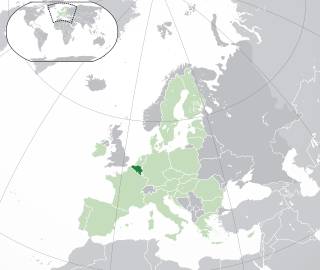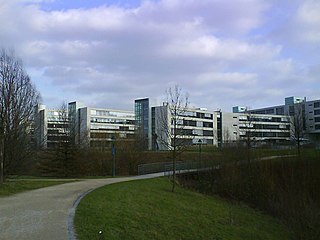
Belgium, officially the Kingdom of Belgium, is a country in Northwestern Europe. The country is bordered by the Netherlands to the north, Germany to the east, Luxembourg to the southeast, France to the southwest, and the North Sea to the northwest. It covers an area of 30,528 km2 (11,787 sq mi) and has a population of more than 11.5 million, making it the 22nd most densely populated country in the world and the 6th most densely populated country in Europe, with a density of 376/km2 (970/sq mi). Belgium is part of an area known as the Low Countries, historically a somewhat larger region than the Benelux group of states, as it also included parts of northern France. The capital and largest city is Brussels; other major cities are Antwerp, Ghent, Charleroi, Liège, Bruges, Namur, and Leuven.

The regulation of therapeutic goods, defined as drugs and therapeutic devices, varies by jurisdiction. In some countries, such as the United States, they are regulated at the national level by a single agency. In other jurisdictions they are regulated at the state level, or at both state and national levels by various bodies, as in Australia.

Paliperidone, sold under the trade name Invega among others, is an atypical antipsychotic. It is mainly used to treat schizophrenia and schizoaffective disorder.
The Institut de veille sanitaire was a French public establishment of the Health minister. It was merged in 2016 with other health agencies into the Agence nationale de santé publique .
In Denmark, pharmaconomists are experts in pharmaceuticals who have trained with a 3-year tertiary degree. Pharmaconomy describes either their professional practice or their training courses.

The Federal Institute for Drugs and Medical Devices is the medical regulatory body in Germany. It operates under the Federal Ministry of Health (BMG). It is headquartered in Bonn, Germany. Its president is Prof. Dr. Karl Broich.
The Patented Medicine Prices Review Board is a federal quasi-judicial regulatory and reporting agency in Canada with a mandate to protect consumers by ensuring that the prices of patented medication charged by manufacturers of patented drugs are not excessive. The board does this through its role as a regulator, and through its reporting on trends, research and development in the Canadian pharmaceutical industry.

The Robert Koch Institute (RKI) is a German federal government agency and research institute responsible for disease control and prevention. It is located in Berlin and Wernigerode. As an upper federal agency, it is subordinate to the Federal Ministry of Health. It was founded in 1891 and is named for its founding director, the founder of modern bacteriology and Nobel laureate Robert Koch.
Wolfgang Wodarg is a German physician and politician. He was a member of the Bundestag for the SPD from 1994 to 2009.

Agence nationale de sécurité du médicament et des produits de santé (ANSM) superseded the tasks and duties of Agence française de sécurité sanitaire des produits de santé (AFSSAPS) on 1 May 2012. It is responsible for assessing the benefits and risks associated with the use of drugs and other medical products throughout their life-cycle. ANSM assesses the safety, efficacy and quality of these products and must balance patient safety with access to novel therapies.

BIA 10-2474 is an experimental fatty acid amide hydrolase inhibitor developed by the Portuguese pharmaceutical company Bial-Portela & Ca. SA. It interacts with the human endocannabinoid system. The drug was in development for the treatment of a range of different medical conditions from anxiety disorder to Parkinson's disease, also for the treatment of chronic pain of multiple sclerosis, cancer, hypertension or the treatment of obesity. A clinical trial with this drug was underway in Rennes, France, in January 2016, in which serious adverse events occurred affecting five participants, including the death of one man. The underlying mechanism that caused the acute neurotoxicity of this molecule remains unknown.
Catherine Fonck is a nephrologist and Belgian politician. She is currently a member of the Centre démocrate humaniste (cdH).

Cannabis in France is illegal for personal use, but remains one of the most popular illegal drugs. Limited types of cannabis-derived products are permitted for medical uses.
The distribution of medications has special drug safety and security considerations. Some drugs require cold chain management in their distribution.

Pauline Londeix is a French activist researcher and writer, who has been particularly involved in the fight for the access to generic medicines used against HIV and Hepatitis C virus (HCV), in particular through contributing to challenging monopolies and intellectual property barriers in the Global South, but also in high income countries, such as France. In 2008, she was the Vice President of the French HIV/AIDS organisation Act Up-Paris. In 2011, she co-founded Act Up-Basel.
The Federal Agency for the Safety of the Food Chain (FASFC) is an authority tasked with ensuring the quality and safety of foodstuffs in Belgium, and safeguarding plant, animal and human health this way. It controls and inspects all processes in the food industry "from farm to fork", meaning all food production, food processing, food distribution and food service. With food safety in mind, the agency is also responsible for combating animal and plant diseases.

UCLouvain Bruxelles Woluwe, also known as Louvain-en-Woluwe or Alma, is a campus of the University of Louvain in Brussels, Belgium. The campus, built in the 1970s following the Leuven crisis, houses the Faculties of Medicine and Dentistry, Pharmacy and Biomedical Sciences and of Public Health, the Cliniques universitaires Saint-Luc, the university's main academic hospital, as well as many other institutions of higher education and a vast sports complex.
Giulio Muccioli is a pharmacologist and bioanalyst who is professor and director of research at the University of Louvain (Belgium). He is recognized as a world expert in endocannabinoid receptors. His research is focused on the roles of bioactive lipids both in physiological and pathological situations, mainly related to inflammation.









